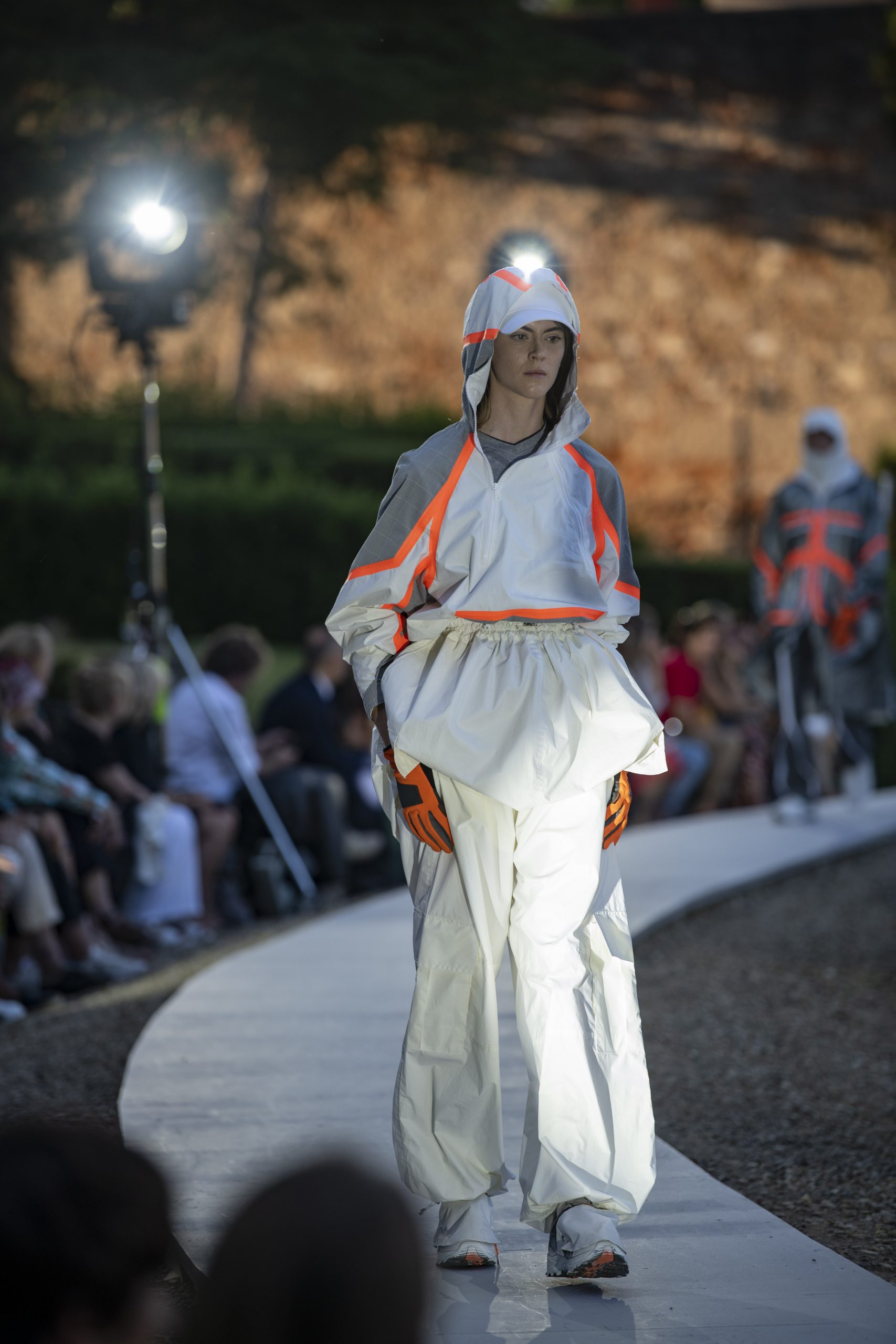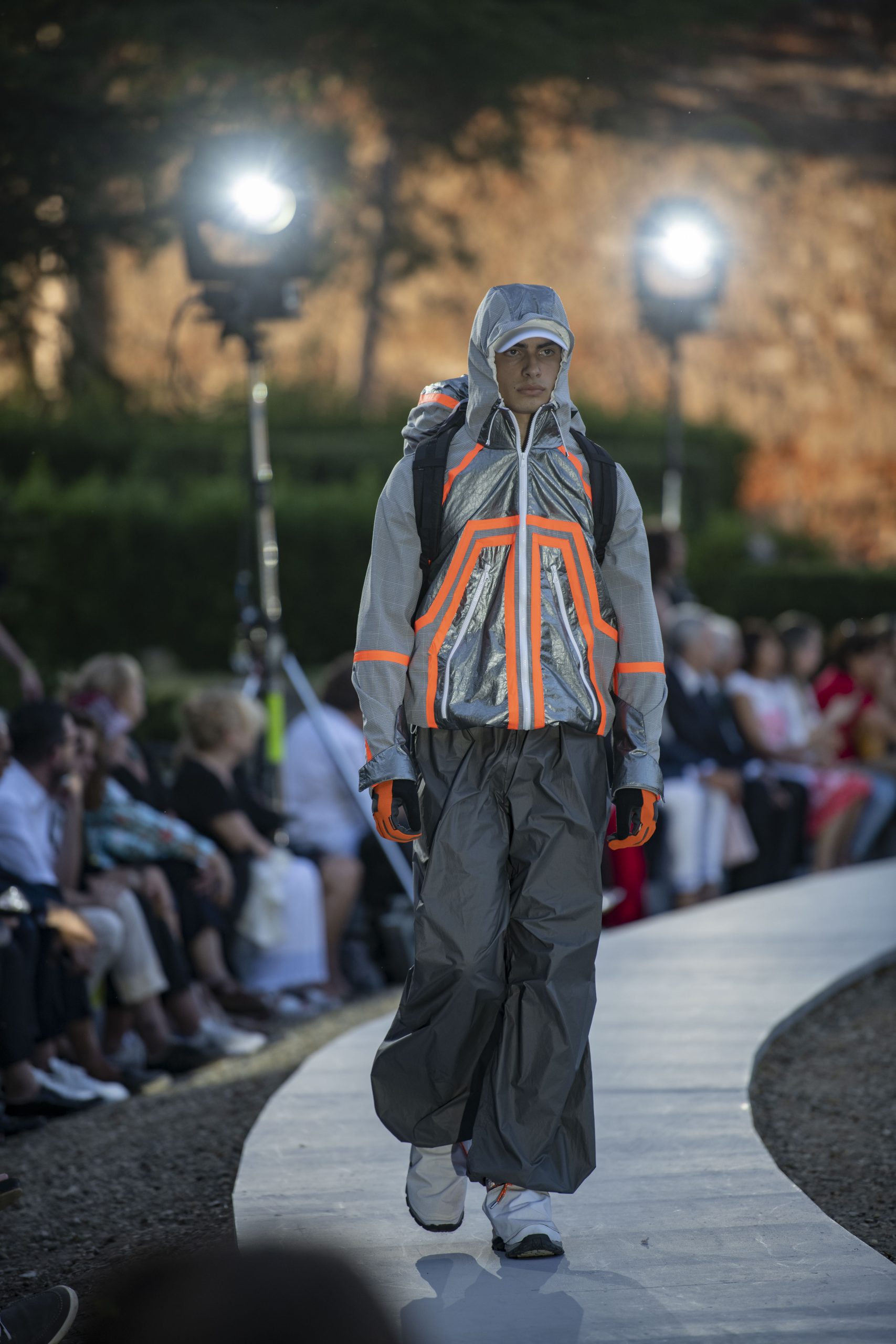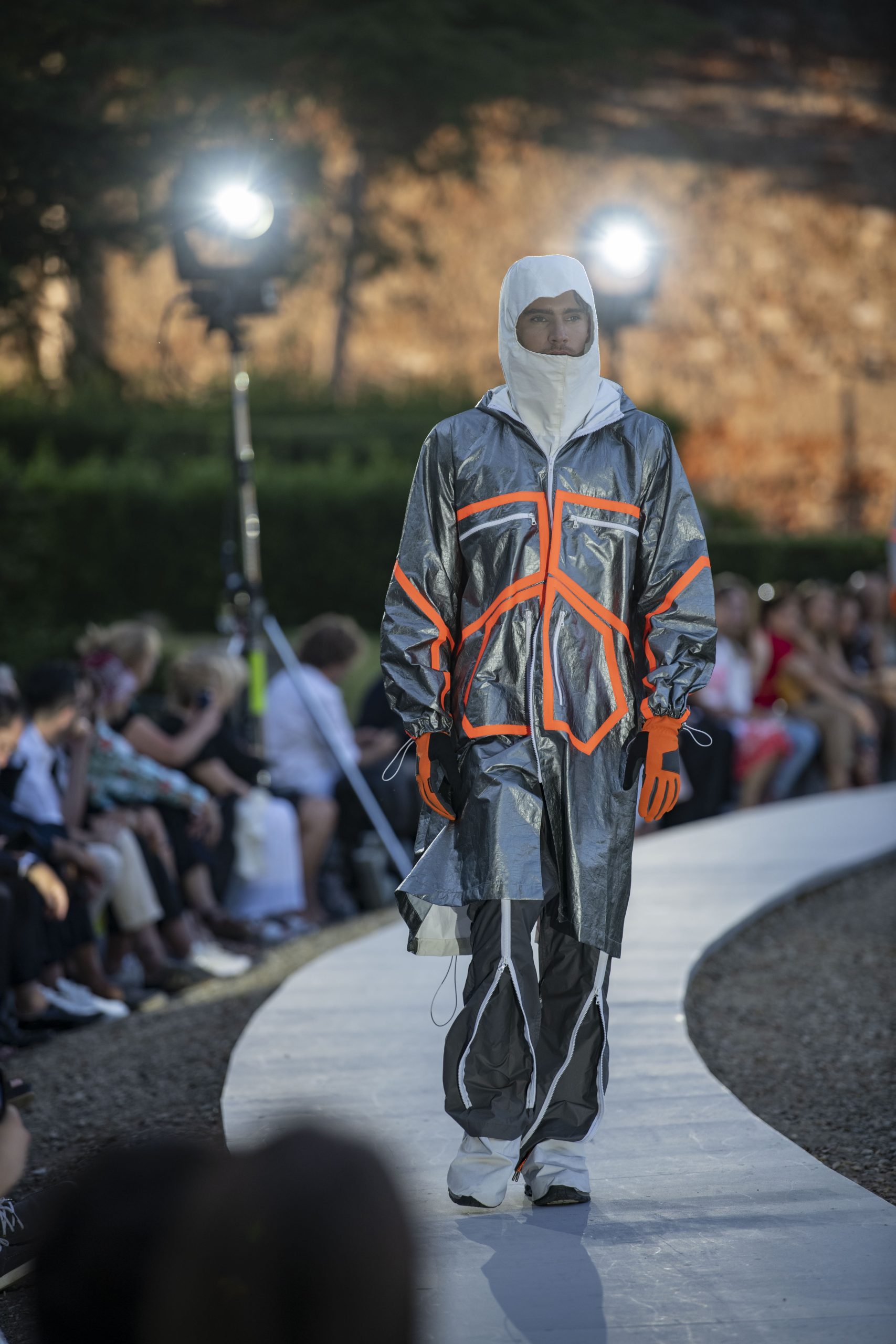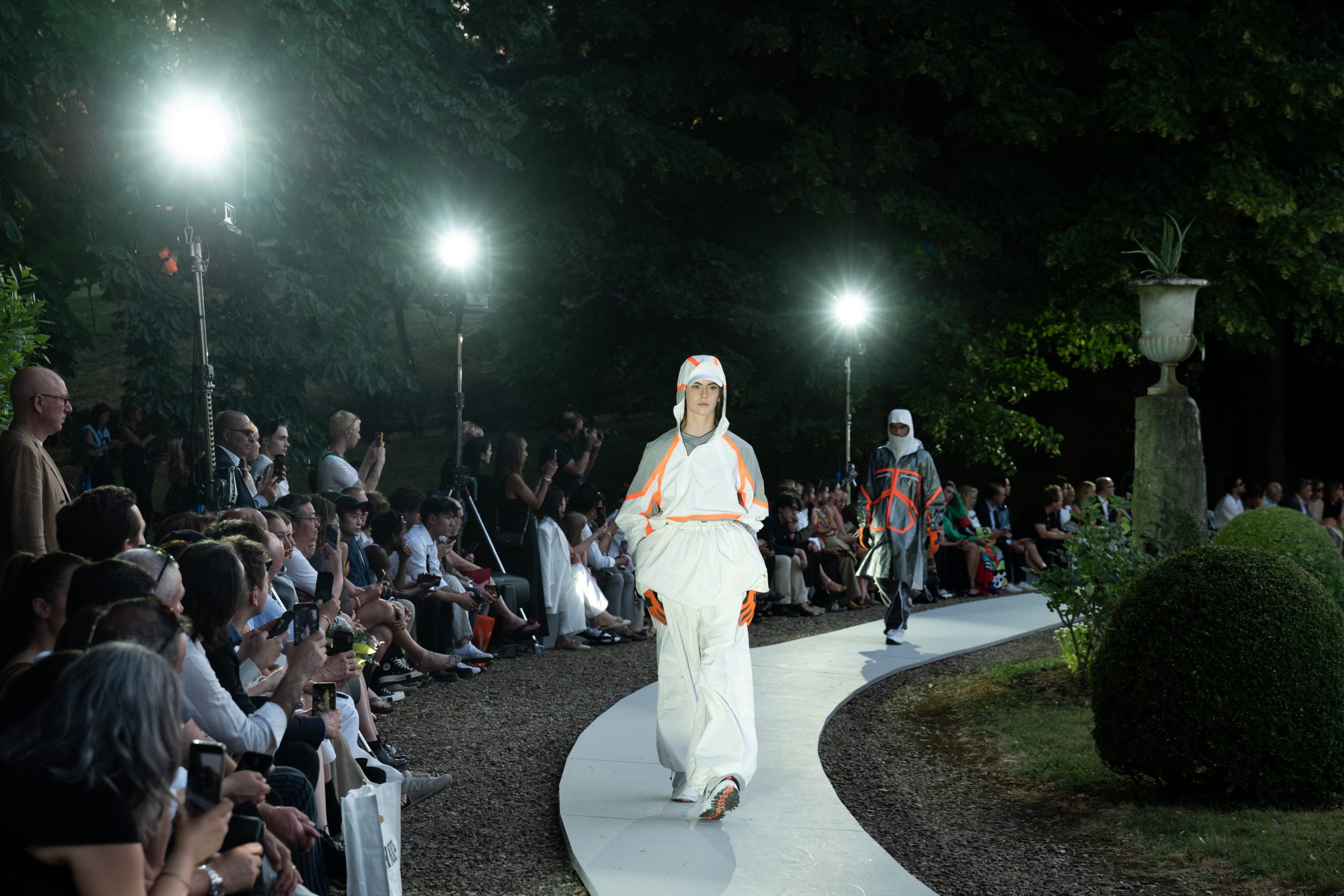Share this
Framis Italia continues collaborating with the Politecnico di Milano, assigning a workshop with the concept “UNI.CO”, a new way of looking at fashion, renewed and animated by intelligent and sensitive design powered by a circular economy.
The workshop
The workshop, which involved 15 students from the Fashion Design Department at the Politecnico di Milano, dealt with the topic “MONO-MATERIAL DESIGN”. The students’ research enabled them to establish a link between the design of contemporary garments and the sustainable evolution of UNI.CO, the first co-polyester thermo-adhesive tape and film developed by Framis Italia. Students followed design-for-recycling principles by designing garments that are 100% polyester, so easily recyclable, comfortable, and seamless, thanks to innovative tailoring techniques such as fabric lamination and heat-sealed and taped seams.
Stylistic research has focused on technical outerwear, suitable for a modern, urban look, enhanced by the sustainable features, exclusive performances and functional and decorative versatility of UNI.CO.
One of the critical principles of design-for-recycling is to reduce the number of different materials in a product. With this in mind, Framis Italia set out to develop a thermo-adhesive tape and film that would enable the design of mono-material garments.
After three years of work and research, the company launched UNI.CO, the first co-polyester film and tape, enabling the design and manufacture of 100% polyester garments and thus facilitating their recycling in the post-consumer phase.
The four finalist students presented their project in a lookbook rich in images and completed by a shooting that actively involved the project’s designers themselves. A video then shows the path of each by bringing out peculiarities that led to the selection of the four finalist designers: Marco Bortolotto, Lorenzo Costanzini and Martino Fois.
Can fashion be completely recyclable? The new collaboration between D-house Laboratorio Urbano and Framis Italia give rise to a garment that can be 100% recycled
The "UNI.CO" project was born from the collaboration between Framis Italia and D-House Laboratorio Urbano joining an innovative synergy aimed at transmitting and providing a new experimentation in a sustainable key.
D-house urban laboratory - research and development hub with a pioneering approach in the introduction of new technologies and implementation of innovative solutions - and Framis Italia - leading company in the production of the most sustainable and innovative solutions and customizable thermo-adhesive applications – synergistically combine their skills for the development and application of UNI.CO, a mono-material tape in polyester, a collaboration aimed at creating a totally recyclable garment in the sportswear fashion sector.
The UNI.CO project was born from the need and the sensitivity of D-house and Framis Italia in responding to some current environmental issues on the theme of recycling: simplifying, improving and optimizing the disposal process of polyester garments.
It is known how the use of different materials from different polymeric matrices generates a tremendous complexity during the recycling phase. Currently, especially in the field of sportswear, polyurethane is the most widely used material among thermo-adhesive applications and it has a severe impact on the recycling phase of a polyester garment.
The project wants to overcome this barrier and UNI.CO represents the turning point for obtaining fully recyclable Polyester and CoPL garments.
As a result, a capsule collection of 5 clothes 100% polyester was created with the innovative tape produced by Framis Italia and the fabrics supplied by Lamintess Srl. The garments were designed by the emerging designer Alessandro Rupilli, manufactured by Dyloan Bond Factory - the manufacturing hub of the Pattern Group - where the entire process was followed and managed by D-house urban laoratory.
This revolutionary experiment will be presented to insiders and industry professionals during "ISPO Munich 2022" from 28 to 30 November, the most relevant fair in the world for the sports sector. Within Framis Italia Booth, an entire area will be dedicated to the presentation of the "UNI.CO" project and to the exhibition of the capsule collection that give shape to it, revealing the products’ innovative potential.
The partnership between D-house and Framis Italia is a concrete example of a synergic collaboration in the textile sector which proves the commitment in responsible innovation and in cutting-edge technologies application for the fashion sector. An important step towards an increasingly conscious and sustainable approach in an industry that realizes one of the greatest environmental impacts.
Deeply committed to its constant pursuit of innovation, Framis Italia is always prompt to help young designers shape the future of fashion.
Recently, we had a chat with Gaia Invernizzi, a talented young designer with whom we collaborated to develop a project that offers a deep look into the perception of self, body and form.
Ciao Gaia, tell us something about you!
I'm Gaia Invernizzi, I'm 21 and I come from Bergamo, a city where I developed an interest in art thanks also to the course of studies undertaken in high school. Then, I started experimenting with new means of expression that went beyond painting and sculpture, establishing an early connection with fashion that also influenced my university choice.
I'm currently a graduate student in fashion design at the Istituto Europeo del Design in Milan. For years I've been carrying out research based on the study of the body and form, its possible alterations and capacity for development and modification. Through garments, in fact, the body can discover new and unconventional forms that subjectively are accepted with difficulty.
Ekspansi is the collection you took to the runway during Milano Moda Graduate 2022, the annual fashion show promoted by Camera Nazionale della Moda Italiana at the opening of Milan Fashion Week. What are the main features of this project?
To look at themselves and not know themsleves, to look at themselves and not accept themselves. A body, an irregular mass, the constant deformation.
On the basis of this, dysmorphophobia develops: a pathology that hinders the relationship with one's own person by going to change what is the perception of the body and shape. This kind of pathology creates social anxieties that lead the subject to close in on himself.
Ekspansi (lett. to expand, to take space) is a project that taking into analysis this situation - which is becoming more and more widespread -has given birth to a collection with the purpose of adapting to forms but above all being able to modify itself in such a way as to make the person free to choose its use according to circumstances and personal will.
The recurring volumes do not follow the lines of the body, but deviate, creating a 'non-body' that rests on what is seen as support. After an initial contact with the dress, one perceives the ease with which one is able to move and relate to the space freely. Everything takes on a new form the moment one wishes to take advantage of all the functions and possibilities that a garment possesses.
Research and Development are concepts that are becoming increasingly popular in the collective imagination of fashion. What role did the research and development of materials, finishes, and textures play within the project?
The same possibility of deforming the garment is highlighted by manipulations with internal wire structures (which can be modified as desired) and burns, but also by fabrics made by laminating three different layers. The result is an irregular hand and a sculptural effect. At the same time, I decided to use technical fabrics that possess different performances: reflective, heat-sensitive, memory and writing effects.
Innovative zipper technology is also exploited, which allows the garments to be opened even through only a slight force applied to the slider.
As for the finishing, I alternated hand stitches, to give a more sartorial touch, with Framis Italia thermoadhesive tapes both for their technical properties and for the precision and cleanliness they give to the garment.
Which features of heat-welding tapes prompted you to use them within your project?
Actually, there is no single feature that led me to opt for the use of tapes on my garments, rather a combination of many.
In fact, what steered my choice toward thermoadhesive tapes was precisely their versatility, which allowed me both to take advantage of the waterproofing and air resistance for which they are usually used, and to give greater solidity to seams and structure in general-a key aspect when it comes to garments that can be manipulated and transformed continuously.
Last but not least, applying tape to a garment can achieve a cleaner finish while creating a pattern that shows its construction and joints. In my case, thanks to some semi-transparent fabrics, in some places this pattern is also visible on the outside.
How did you get to know Framis Italy and the Bonding Technology?
From the earliest stages of the project I realized that in order for my garments to be able to transform and adapt to the wearer's body, I would have to design and construct them paying particular attention to strength. The choice fell on bonding technology, which I had already seen applied in several garments - by established and non-established designers - and through various researches I discovered Framis Italia and the constant collaborative relationship the company has with students and emerging designers.
The collaboration began smoothly and quite naturally, and it gave me access to a technology that later turned out to be fundamental to the final performance of my garments!
Thank you for sharing the story of this amazing project with us. Plans for the future?
For the future? To continue to constantly experiment, questioning myself and the vision I have of the form. Not stopping at things that convince me at first glance but digging, modifying until I arrive at something extremely close to my identity.
I am open to anything that can add important pieces to both personal and work/project growth.
Good luck, Gaia!
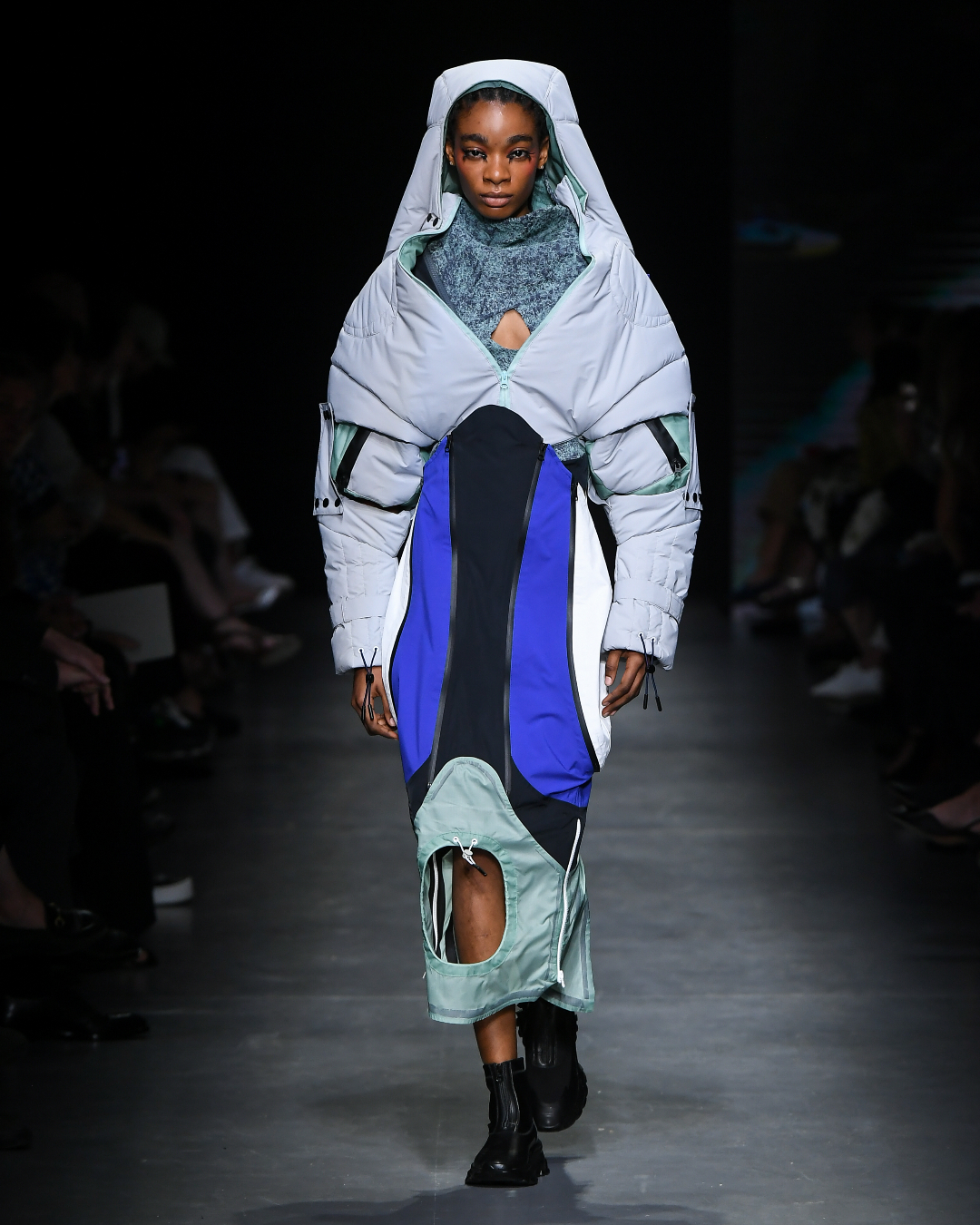
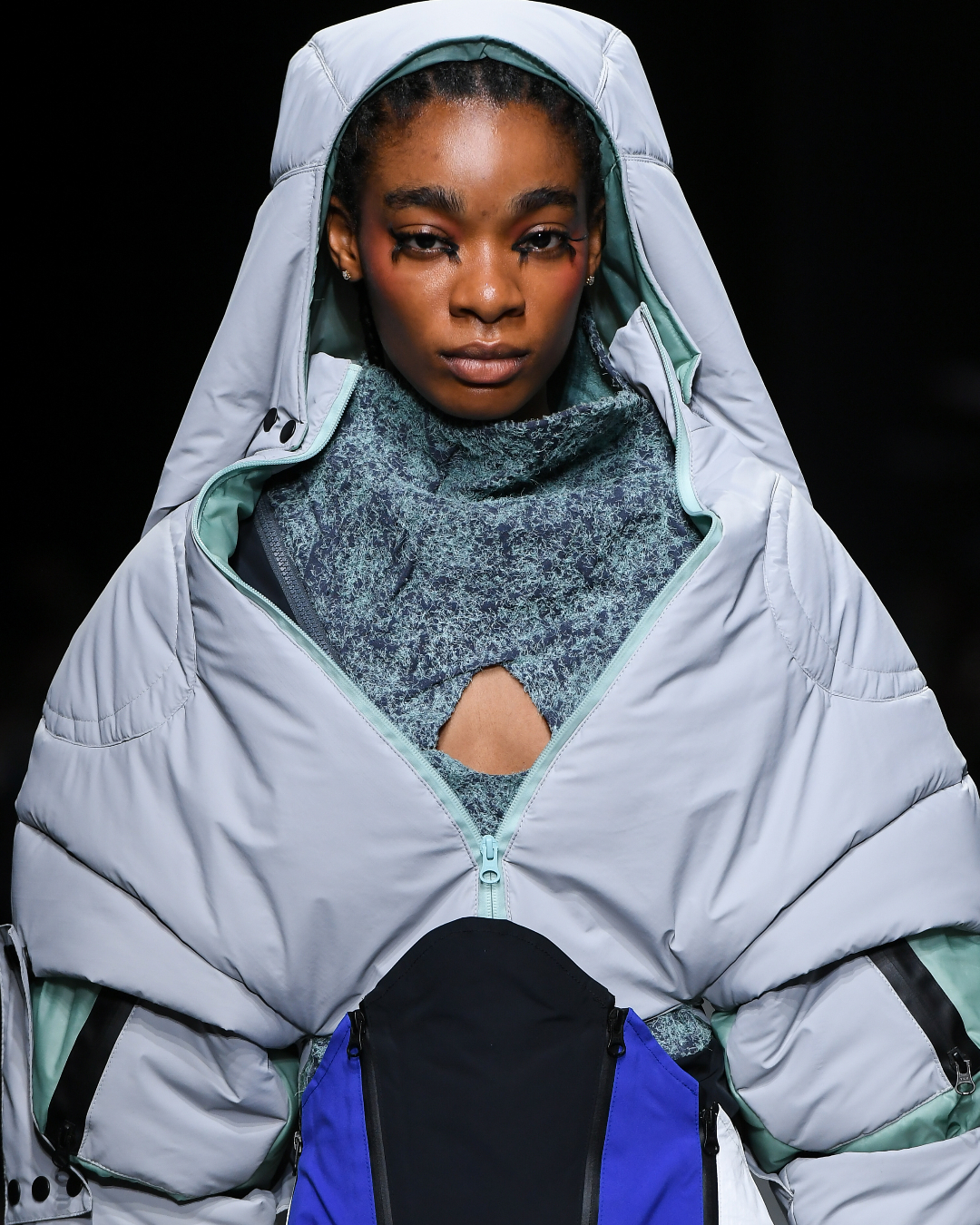
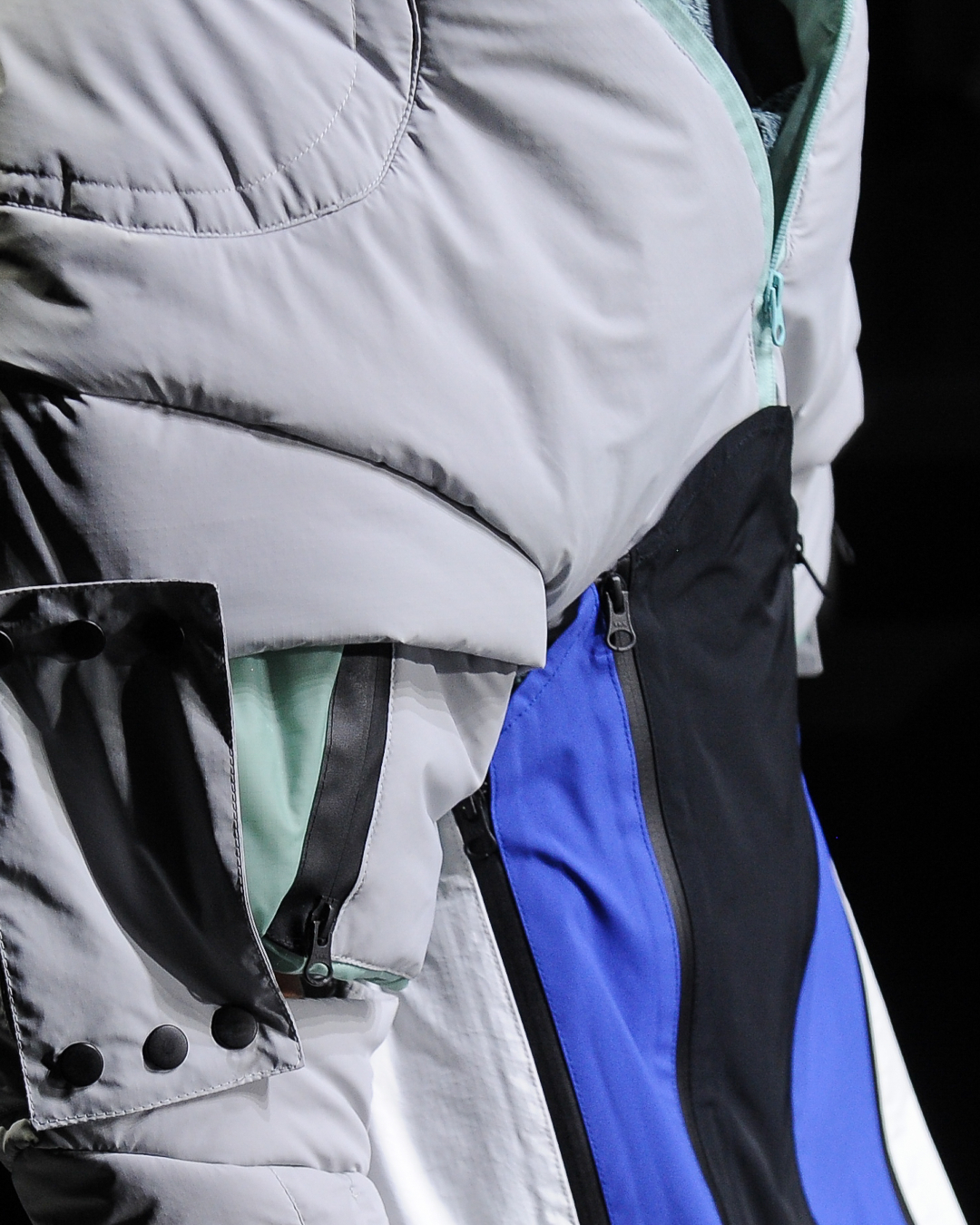
Share this
Deeply committed to its constant pursuit of innovation, Framis Italia is always prompt to help young designers shape the future of fashion.
Recently, we had a chat with Edoardo Cavrini, a talented young designer with whom we collaborated to develop a project that offers a new perspective on the dichotomy between aesthetics and functionality.
Ciao Edoardo, tell us something about you!
Class of '99, I grew up in Bologna where I spent 19 years of my life before moving to Florence to take on my biggest gamble: pursuing a path of artistic studies. With a scientific background, I decided to enroll at Polimoda, Firenze, in the Fashion Design Management course. To this day, I can only call myself satisfied with the decision I made.
Between sports, sneakers, and collecting, I've always given importance to aesthetics (I remember that I started following soccer attracted by the players' boots), an element that I try to include in every single aspect of my daily life.
Experimenting over time, however, I realized that aesthetics was nothing if not paired by a good share of functionality. What do I do with beauty if I actually cannot use it? From this question, I began what was the path that, in my last year of University, led me to the creation of "Epsilon Project," my first collection.
Besides being your first collection, Epsilon Project is the vision you brought to the runway during "Carpe Noctem," the opening fashion show of the 102nd edition of Pitti Uomo. What are the main features of this project?
With the "Epsilon Project" I aimed to bring together my products with the utilitarian aspect that usually distinguishes mountain garments. I tried to meet all those people who, lost in the urban chaos - marked by getting on and off public transports, rain, and temperature changes between offices and the outdoors - could find relief in technical jackets, capable of adapting to their needs, while curbing the hustle and bustle of everyday life.
To achieve all this, it was undoubtedly crucial to go through the entire development process by paying special attention to the R&D stage, the prototyping stage, and especially the choice of materials.
Research and Development are concepts that are becoming increasingly popular in the collective imagination of fashion-just think of the "spray" dress presented during the recent Coperni fashion show, which immediately went viral. What role did the research and development of materials, finishes, and textures play within the project?
The materials research was one of the crucial steps in the whole project. I had to go to support a range of products designed to be functional, with fabrics that would maintain the high standards of the jackets I made. Cordura, ultralight and waterproof nylon, micro ripstop cotton and waxed poplin are some of the ingredients I decided to "season" with the orange heat-welding tape produced by Framis Italia.
Which features of heat-welding tapes prompted you to use them within your project?
First and foremost, their technical features. To windproof a jacket and waterproof its seams are both the key features for which I chose heat-welding tapes. Of equal importance was the wide color range provided by Framis Italia, which was ideal for supporting my ideal of functional beauty.
How did you get to know Framis Italy and the Bonding Technology?
As a fan of technical clothing, I've always seen Bonding Technology as one of the key techniques to the crafting of a functional product. I find the patterns that thermoadhesive tapes create on the inside of a jacket fascinating. So I decided to bring the inside to the outside, and play with this technology. On my professors' advice, I learned about Framis Italia, a company that gave me the opportunity, thanks to its wide product portfolio, to merge aesthetics and functionality. A dualism that accompanied me throughout the process of designing the "Epsilon Project."
Thank you for sharing the story of this amazing project with us. Plans for the future?
At the moment I'm very focused on the development of "Epsilon Project"-some products will be available for sale soon. Working on the of the garments' commercialization is a whole other challenge that I'm extremely enjoying. In the meantime I think I will continue to try, by designing, to make more and more functional and comfortable clothing for all urban outdoor enthusiasts.
Good luck, Edoardo!
